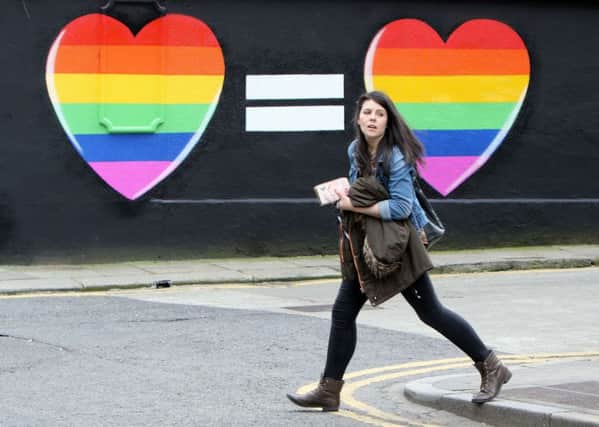Ireland goes to polls to vote on gay marriage


On the eve of a referendum on whether to give same same-sex couples equal status under the country’s constitution, Joan Burton said the reform is about embracing minorities.
More than 3.2 million voters are being given their say on whether to accept a reform already in place in 21 other countries.
Advertisement
Hide AdAdvertisement
Hide AdAfter weeks of debate the public are being asked to change the 1937 constitution to include a clause stating that the lifelong commitment and union of marriage be extended to same-sex couples.
The vote is being held 22 years after Ireland decriminalised homosexuality.
In her final appeal to the electorate, Ms Burton, the leader of the Labour Party which pushed for the right to gay marriage, said Ireland has moved from a conservative and authoritarian state to one of the most open and liberal societies in Europe.
“It is about acceptance in your own country,” she said.
“It is about being accepted as equal citizens in your own country. It is about making a statement about the country we want to live in, the country we want to create.
“It is about embracing the minority of our fellow citizens who are gay and proclaiming loudly to the world that equality under the law is a cornerstone of our Republic.”
While Ireland is by no means the first country to consider extending marriage rights to gay people, it is the first time the contentious subject has gone to a popular vote.
The proposal being put to the ballot relates to Article 41 of the constitution, titled The Family.
It asks voters to support or reject a new clause being added to the 78-year-old document to read: “Marriage may be contracted in accordance with law by two persons without distinction as to their sex.”
Advertisement
Hide AdAdvertisement
Hide AdIt does not suggest any change to the definition of the family or remove any outdated references including those that state a woman’s place is at home and she should be supported to remain at home.
If passed it will be the 34th constitutional amendment.
The Yes campaign has been backed by all the main political parties but a small number of backbenchers are to vote no.
In recent days concerns have grown that the more conservative politicians from the Fianna Fail and Fine Gael parties did not sufficiently canvass support, particularly in rural areas, amid fears of a backlash at next year’s general election and a sense of complacency that the proposal would be accepted.
There is also the question of the growing silent No vote.
Opinion polls put the Yes side well in front up until a week ago, but concerns have been growing about undecided voters - around a quarter of those polled declined to declare their intentions.
However, there has been a surge of more than 60,000 voters added to the electoral register in the last few months, largely down to the referendum being held on a Friday, allowing students to return home to vote, and the publicity drive to engage young voters.
As expected the Catholic Church is against the proposal.
Archbishop of Dublin Diarmuid Martin, in his final media appearance, appealed for voters to consider the ramifications.
“Marriage is about a man and woman coming together, becoming father and mother, and there is something in that. Changing that will leave people uncertain. I can’t promise what happens after the referendum,” he said.
“I am not a prophet or a fortune teller but this will be interpreted by the courts and in what way we don’t always know.”
Advertisement
Hide AdAdvertisement
Hide AdThe Yes Equality group issued a final day appeal to what it said was the generous, compassionate and fair nature of Irish people.
Grainne Healy, one of the directors, said: “Young and old, urban and rural, this is a people’s referendum.
“The spontaneous momentum witnessed in Ireland for marriage equality has been incredible, humbling and historic.”
More than 2,000 islanders eligible to vote began heading to polling stations off Donegal, Mayo and Galway today, maintaining a tradition of early offshore polling days for fear that bad weather will disrupt the counts.
From a more practical point of view, polling stations open at 7am today and close at 10pm. The counting of ballots starts in the 43 constituencies at 9am tomorrow, and picture of how tight the contest has been should emerge by midday.